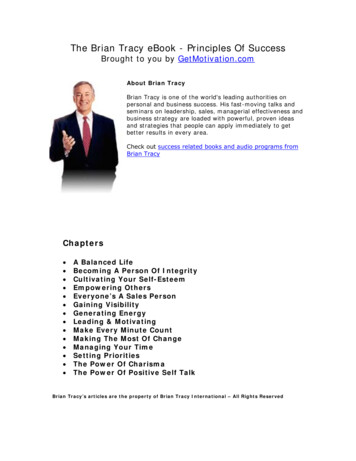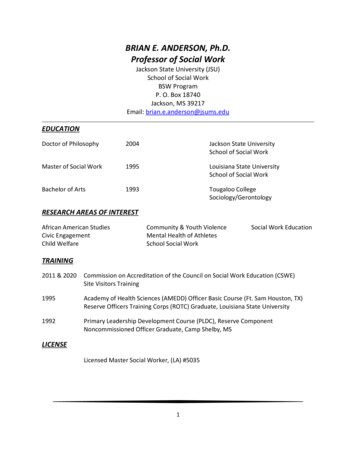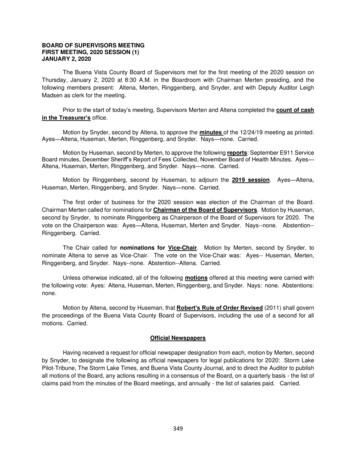
Transcription
Brian Johnson’sPhilosophersNotesTMMore Wisdom in Less TimeSelf-CompassionTHE BIG IDEASThe Proven Power of Being Kind to YourselfSelf-Compassion DefinedBY KRISTIN NEFF, PH.D. · WILLIAM MORROW 2011 · 320 PAGESThe three key components.#1. Self-KindnessBe nice to yourself!#2. Common HumanityWe’re all in this together.#3. MindfulnessSeeing reality clearly.Suffering Pain x ResistanceThe Noting PracticeIs worth noting.Re-Setting ExpectationsIt’s not all supposed to be perfect.Failure Life’s apprenticeship.Self-EfficacyIs enhanced via self-compassion.“The research that my colleagues and I have conducted over the past decadeshows that self-compassion is a powerful way to achieve emotional well-being andcontentment in our lives. By giving ourselves unconditional kindness and comfortwhile embracing the human experience, difficult as it is, we avoid destructivepatterns of fear, negativity, and isolation. At the same time, self-compassionfosters positive mind-states such as happiness and optimism. The nurturingquality of self-compassion allows us to flourish, to appreciate the beauty andrichness of life, even in hard times. When we soothe our agitated minds with selfcompassion, we’re better able to notice what’s right as well as what’s wrong, so thatwe can orient ourselves toward that which gives us joy. . . .You can’t always have high self-esteem and your life will continue to be flawed andimperfect—but self-compassion will always be there, waiting for you, a safe haven.In good times and bad, whether you’re on top of the world or at the bottom of theheap, self-compassion will keep you going, helping you move to a better place. Itdoes take work to break the self-criticizing habits of a lifetime, but at the end of theday, you are only being asked to relax, allow life to be as it is, and open your heartto yourself. It’s easier than you might think, and it could change your life.” Kristin Neff from Self-CompassionI first heard about Kristin Neff and her work from Brené Brown—who is a huge (!) fan. (See“Compassion involvesthe recognition and clearNotes on Brené’s great books Daring Greatly The Gifts of Imperfection.)And I can see why Brené is such a big fan. Kristin is awesome.seeing of suffering. ItKristin is one of the world’s leading researchers on self-compassion. In fact, she is the one whoalso involves feelings offirst established self-compassion as a field of study almost a decade ago—bringing the Buddhistkindness for people whopractice of self-compassion into her labs so the benefits could be empirically validated. Very coolare suffering, so that thedesire to help—to amelioratesuffering—emerges. Finally,compassion involvesrecognizing our sharedhuman condition, flawed andfragile as it is.” Kristin Neffstuff.The book walks us through the scientific research underpinning the why’s and how’s ofcultivating our self-compassion and is packed with theoretical and practical goodness.Let’s start by defining self-compassion then looking at the three keys to self-compassion (selfkindness common humanity mindfulness) in more detail plus some of my favorite Big Ideasto help us bring this to life!SELF-COMPASSION: DEFINED“As I’ve defined it, self-compassion entails three core components. First, it requires selfkindness, that we be gentle and understanding with ourselves rather than harshly critical andjudgmental. Second, it requires recognition of our common humanity, feeling connected withothers in the experience of life rather than feeling isolated and alienated by our suffering.1PhilosophersNotes Self-Compassion
Third, it requires mindfulness—that we hold our experience in balanced awareness, ratherthan ignoring our pain or exaggerating it. We must achieve and combine these three essentialelements in order to be truly self-compassionate.”Self-compassion has three primary components:1.Self-kindness. In short: We need to be nice to ourselves! Beating ourselves up not helpful.2.Common humanity. We’re not alone. It’s important to see that our suffering is a part of theshared human experience.3.Mindfulness. We want to observe our experience—holding it in “balanced” awarenesswithout trying to push our pain away or make it a bigger deal than it is.Kristin unpacks each of those core ideas in its own chapter and comes back to them throughoutthe rest of the book as we apply self-compassion to different aspects of our lives.Powerful stuff.Let’s take a quick look at each in a little more detail.#1: SELF-KINDNESS“You don’t want to beat“Self-kindness, by definition, means that we stop the constant self-judgment and disparagingyourself up for beatinginternal commentary that most of us have come to see as normal. It requires us to understandyourself up in the vain hopethat it will somehow makeyou stop beating yourselfup.” Kristin Neffour foibles and failings instead of condemning them. It entails clearly seeing the extent to whichwe harm ourselves through relentless self-criticism, and ending our internal war.But self-kindness involves more than just stopping self-judgment. It involves actively comfortingourselves, responding just as we would to a dear friend in need. It means we allow ourselves tobe emotionally moved by our own pain, stopping to say, “This is really difficult right now. Howcan I care for and comfort myself in this moment?” With self-kindness, we soothe and calm ourtroubled minds. We make a peace offering of warmth, gentleness, and sympathy from ourselvesto ourselves, so that true healing can occur.”Self-kindness.Our first key component to self-compassion.I love the image of treating *ourselves* in the same way we would want to treat a dear friend—slowing down and allowing ourselves to be emotionally moved by our own pain and activelycomforting ourselves.First step: Stop the internal heckling. You know, fun stuff like, “Why are you such an idiot?!”And, “I can’t believe you did/said that. Wow.”Instead, we can (literally) say to ourselves, “Gah. I feel your pain right now. This is tough. Howcan I best take care of myself right now?”In short: BE NICE TO YOURSELF.Sounds simple. But it’s huge.Self-Kindness. That’s step #1 in self-compassion.#2: COMMON HUMANITY: WE’RE ALL IN THIS TOGETHER“The second fundamental element of self-compassion is recognition of the common humanexperience. Acknowledgment of the interconnected nature of our lives—indeed of life itself—helps to distinguish self-compassion from mere self-acceptance and self-love. Although selfacceptance and self-love are important, they are incomplete by themselves. They leave out anessential factor—other people. Compassion is, by definition, relational. Compassion literally2PhilosophersNotes Self-Compassion
means “to suffer with” which implies a basic mutuality in the experience of suffering. The“Sadly, however, most peopledon’t focus on what theyhave in common with others,especially when they feelashamed or inadequate.Rather than framing theirimperfection in light of theirshared human experience,they’re more likely to feelisolated and disconnectedfrom the world around themwhen they fail.” Kristin Neffemotion of compassion springs from the recognition that the human experience is imperfect.Why else would we say “It’s only human” to comfort someone who has made a mistake? Selfcompassion honors the fact that all human beings are fallible, that wrong choices and feelingsof regret are inevitable, no matter how high and mighty one is. (As the saying goes, a clearconscience is usually the sign of a bad memory.)When we’re in touch with our common humanity, we remember that feelings of inadequacyand disappointment are shared by all. This is what distinguishes self-compassion from self-pity.Whereas self-pity says “poor me,” self-compassion remembers that everyone suffers, and itoffers comfort because everyone is human. The pain I feel in difficult times is the same pain youfeel in difficult times. The triggers are different, the circumstances are different, the degree ofpain is different, but the process is the same. You can’t always get what you want. This is truefor everyone, even the Rolling Stones.”Common humanity.What a beautiful concept.In our hyper-individualistic, equally hyper-comparative society, it’s easy to always try to outdoeveryone around us and feel disconnected—either better than or worse than those around us.But what if we slowed down and appreciated our sameness? The fact that, as Kristin points out,we’re all in this together. That we share a common humanity.That’s our second key component to self-compassion.Goes nicely with self-kindness. And with our third component: Mindfulness.#3: MINDFULNESS“The third key ingredient of self-compassion is mindfulness. Mindfulness refers to the clearseeing and nonjudgmental acceptance of what’s occurring in the present moment. Facing up toreality, in other words. The idea is that we need to see things as they are, no more, no less, inorder to respond to our current situation in the most compassionate—and therefore effective—manner.”Mindfulness.“To give ourselvescompassion, we first haveto recognize that we aresuffering. We can’t healwhat we can’t feel.” Kristin NeffThis is a great definition: “the clear seeing and nonjudgmental acceptance of what’s occurringin the present moment.”It’s easy to either ignore or exaggerate our experience.To clearly, nonjudgmentally see reality?That takes some practice. :)SUFFERING PAIN X RESISTANCE“I once went on a meditation retreat with a wonderful teacher named Shinzen Young, who gaveme words of wisdom that I’ll never forget. He said that the key to happiness was understandingthat suffering is caused by resisting pain. We can’t avoid pain in life, he said, but we don’tnecessarily have to suffer because of that pain. he chose to express these words of wisdom withan equation: “Suffering Pain x Resistance.” He then added, “Actually, it’s an exponential ratherthan a multiplicative relationship.” His point was that we can distinguish between the normalpain of life—difficult emotions, physical discomfort, and so on—and actual suffering, which is themental anguish caused by fighting against the fact that life is sometimes painful.”Suffering Pain x Resistance.PhilosophersNotes Self-Compassion3
“Judgment defines people asAs many wise teachers have told us: Pain is inevitable. Suffering is optional.bad versus good and triesPain happens.to capture their essentialHow we RESPOND to that pain determines our levels of suffering.nature with simplisticlabels. Discriminating wisdomrecognizes complexity andambiguity.” Kristin NeffResist that pain—by trying to convince ourselves that whatever is happening (whether it’ssomething mundane like traffic on the way to work or something more significant like a seriousillness or death of a loved on) and watch the suffering grow exponentially.As Kristin tells us: “Our emotional suffering is caused by our desire for things to be other thanthey are.”Plus: “Once something has occurred in reality, there is nothing you can do to change that realityin the present moment. This is how things are. You can choose to accept this fact or not, butreality will remain the same either way.”How do we properly relate to reality?Mindfulness.The book is packed with practical exercises we can engage in to cultivate self-compassion. This isone of my favorites to help us build mindfulness:THE NOTING PRACTICE“To have any choice in how“An important tool used to develop mindfulness is the practice of noting. The idea is to makewe respond, however, wea soft mental note whenever a particular thought, emotion, or sensation arises. This helps usneed the mental space toto become more consciously aware of what we’re experiencing. If I note that I feel angry, forconsider our options.” Kristin Neffinstance, I become consciously aware that I’m angry. If I note that my back is uncomfortable asI’m sitting at my desk, I become consciously aware of my discomfort. This then provides me withthe opportunity to respond wisely to my current circumstances. Perhaps I should take a few deepbreaths to calm down or stretch to relieve my back pain. The noting practice can be used in anysituation and helps engender mindfulness in daily life.”Noting.It’s a *really* cool (and simple!) way to cultivate mindfulness.Dan Siegel (see Notes on Mindsight) likes to say we need to “name it to tame it.”We need to be able to *see* the state we’re in if we want to wisely respond to that state.I love to use this as a part of my actual meditation at times. For example, when I notice my mindwanders off and I am strategizing or planning I can softly say to myself “. strategy .” or “.planning .” and then bring my attention back to my breath.Or during my day I may notice that I’m feeling a little rushed and I can note that and choose totake a few nice, deep breaths to bring myself back to this moment.How about you?! Give it a shot!RE-SETTING EXPECTATIONS“Everybody makes mistakes at one time or another, it’s a fact of life. And if you think about it,why should you expect anything different? Where is that written contract you signed beforebirth promising that you’d be perfect, that you’d never fail, and that your life would go onabsolutely the way you want it to? Uh, excuse me. There must be some error. I signed up for the“everything will go swimmingly until the day I die” plan. Can I speak to management please?It’s absurd, and yet most of us act as if something has gone terribly awry when we fall down orlife takes an unwanted or unexpected turn.”4PhilosophersNotes Self-Compassion
One of the keys to having compassion for ourselves is to realize that making mistakes, falling“Mindfulness allows usshort of our goals, and life simply not being perfect is PERFECTLY NORMAL.to see that our negativeAs Maslow says, there are no perfect human beings. And, as I say often in these Notes, we aren’tthoughts and emotions arejust that—thoughts andemotions—not necessarilyreality. They are thereforegiven less weight—theyare *observed,* but notnecessarily *believed.*” Kristin Neffgoing to be the first. :)Embracing this fact is extraordinarily liberating. Makes you just want to take a deep breath inand nice, deep exhale to realize you do not (I repeat: do not!) need to be perfect.FAILURE LIFE’S APPRENTICESHIP“Imperfection also makes growth possible. Like it or not, the main way we learn is by fallingflat on our face, just as we did when we first learned to walk. Our parents may tell us a milliontimes not to touch that hot stove, but it’s only after we actually burn ourselves that we reallyunderstand why it’s not such a great idea. The learning opportunities provided by failure canactually help us to achieve our dreams. In the words of restaurateur Wolfgang Puck, “I learnedmore from the one restaurant that didn’t work than from all the ones that were successes.” Yes,failure is frustrating. But it’s also temporary and eventually yields wisdom. We can think offailure as part of life’s apprenticeship. If we were perfect and had all the answers, we’d never getto ask questions, and we wouldn’t be able to discover anything new.”Ah. Mistakes. Failures.Don’t you just love ‘em? Hah. Right.Well, how about we reframe failure and think of it as life’s apprenticeship?!Robert Emmons’ wisdom comes to mind here. Emmons is the world’s leading authority on thescience of gratitude. Check out the Notes on his great book Thanks! where he tells us: “It isrelatively easy to feel grateful when good things are happening, and life is going the way wewant it to. A much greater challenge is to be grateful when things are not going so well, andare not going the way we think they should. Anger, bitterness, and resentment seem to be somuch easier, so much more a natural reaction in times like these.The religious traditions encourage us to do more than react with passivity and resignation toloss and crisis; they advise us to change our perspective, so that our suffering is transformedinto an opportunity for growth. Not only does the experience of tragedy give us an exceptionalopportunity for growth, but some sort of suffering is also necessary for a person to achievemaximal psychological growth. In his study of self-actualizers, the paragons of mentalwellness, the famed humanistic psychologist Abraham Maslow noted that “the most importantlearning lessons. were tragedies, deaths, and trauma. which forced change in the lifeoutlook of the person and consequently in everything that he did.””Goosebumps reading that line by Maslow.And this is worth a re-read: “Not only does the experience of tragedy give us an exceptionalopportunity for growth, but some sort of suffering is also necessary for a person to achievemaximal psychological growth.”Sounds an awful lot like life’s apprenticeship.Can you reframe any failures in your life in a more empowering ( self-compassionate!) way?SELF-EFFICACY SELF-COMPASSION“Researchers who study motivation have consistently found that our level of self-confidence hasa dramatic impact on our ability to reach our goals. Dozens of studies have confirmed that ourbeliefs in our own abilities—which research psychologist Albert Bandura terms “self-efficacy”beliefs—are directly related to our ability to achieve our dreams.PhilosophersNotes Self-Compassion5
For example, one study followed more than two hundred high school wrestlers through the“The curious paradox isthat when I accept myselfjust as I am, then I canchange.” Carl Rogerscourse of one wrestling season. It was found that, independent of prior success at wrestling,those students who had stronger self-efficacy beliefs won more matches than those who doubtedthemselves. This was especially apparent in high-pressure overtime situations where the matchwas tied. Wrestling matches decided in overtime are “sudden death”—where the first wrestler toscore wins. They are difficult because both wrestlers are exhausted, and a tie indicates an evenmatch of physical skills. In such cases, the only factor that predicts a win is the wrestler’s mentalbelief in his own ability.”Wow. First, that’s awesome.Self-efficacy. Our belief in our own abilities. It’s an *incredibly* important part of our ability toactualize our potential and achieve our dreams in life.Second: Can you guess what enhances our self-efficacy?Hint: It’s not self-criticism. (Research shows that self-criticism leads to anxiety which leads to“self-handicapping” protective behaviors like not trying very hard or procrastinating—giving usthe excuse that we just didn’t go for it and that’s why we didn’t succeed. — Not helpful.)How about self-compassion?Yep. That’s where it’s at.Self-kindness common humanity mindfulness does the trick to boost our self-efficacy andboost our shot at achieving our dreams!Brian Johnson,Chief PhilosopherIf you liked this Note,you’ll probably like Daring GreatlyThe Gifts of ImperfectionMindfulnessMindsightWherever You Go, ThereYou AreThe Hows of HappinessAbout the Author of “Self-Compassion”KRISTIN NEFFKristin got her Ph.D. in 1997 at UC Berkeley, studying moral development. Sheis currently an Associate Professor in Human Development at the University ofTexas at Austin.Get the book here and learn more about Kristin at www.self-compassion.org.About the Author of This NoteBRIAN JOHNSONBrian Johnson loves helping people optimize their lives as he studies, embodiesand teaches the fundamentals of optimal living—integrating ancient wisdom modern science common sense virtue mastery fun. Learn more andoptimize your life at brianjohnson.me.6PhilosophersNotes Self-Compassion
I first heard about Kristin Neff and her work from Brené Brown—who is a huge (!) fan. (See Notes on Brené's great books Daring Greatly The Gifts of Imperfection.) And I can see why Brené is such a big fan. Kristin is awesome. Kristin is one of the world's leading researchers on self-compassion. In fact, she is the one who










![JOHNSON AND JOHNSON (PHILIPPINES), INC. [recombinant]), Grand River .](/img/36/eua-janssen-website.jpg)